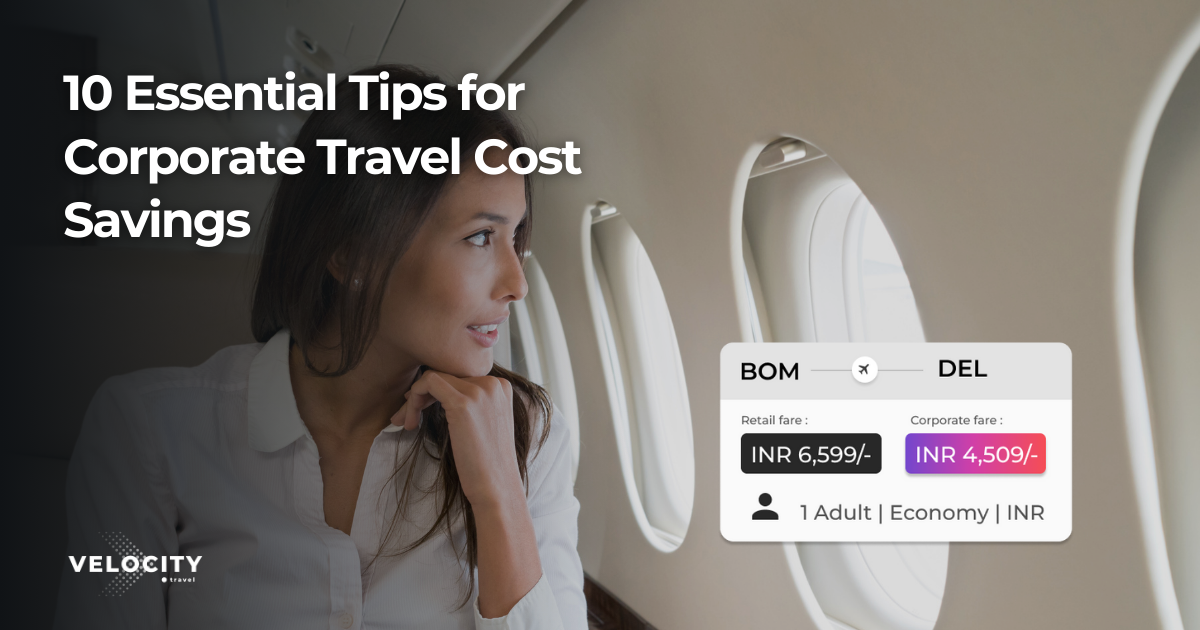Nowadays, traveling for business is a key part of running a company. Many employees go on trips to meet clients, attend events, or work with other teams. Corporate travel costs can be a major expense for firms, so it’s important for both travelers and the finance team to find ways to save money on these trips.
Table of Contents
ToggleSo, how can you save money on business travel? Luckily, there are some smart methods to save money on these trips without reducing their quality. In this article, we’ve created a list of 10 easy and helpful corporate travel cost savings tips to help your firm stay within the budget.
What are Corporate Travel Expenses?
A business travel expense is any cost an employee pays for work-related trips away from the office. This includes things like plane and train tickets, hotel stays, taxi rides, public transport, and sometimes meals.
These costs often come from employees, but they can also be from contractors who travel for your company. This includes people like influencers, repair experts, long-term partners, and others.
Employees can get money back for these travels by filing an expense claim. However, this method is becoming outdated. Nowadays, companies often pay travel vendors directly for all purchases.
Why is it Important to Save Money in Business Trip?
Let’s say your business has had lots of international meetings, trade shows, and networking events recently. Your results are looking good, and clients like the personal interactions. However, along with rising profits, your corporate travel expenses are also increasing.
Reducing corporate travel costs can be tricky, especially if your employees travel to multiple places around the world. However, cutting this cost is important because it helps keep a company’s corporate travel in budget.
Lower travel costs mean more money can be used for other important areas, like improving products or services. This helps the business stay financially stable and plan effectively.
Moreover, being careful with these expenses promotes better spending habits. When employees focus on saving money during trips, it helps avoid unnecessary costs.
What are the Benefits of Tracking Corporate Travel Costs?
Here are some key benefits of monitoring your business travel expenses for corporate travel cost savings:
-
Improves money management
Keeping track of travel expenses helps you see how much you’re spending and on what. It also helps you manage your money better, making it simple to follow a monthly budget and stay aware of your finances.
-
Speeds up the refund process
Sometimes, employees might pay for things like meals and local transportation themselves. Keeping receipts and turning them in helps make sure they get checked and paid back quickly.
-
Creates detailed records
Organizing your payment records can help you prepare for a possible audit. It makes it simpler to show every amount you’ve claimed and prove they were necessary for your job. This practice also contributes to corporate travel cost savings by making sure all expenses are accurately tracked.
-
Helps with tax deduction
Tracing your business travel expenses regularly helps at tax time. It makes it easier to deduct these costs and stay on good terms with the IRS. This way, you can handle your taxes easily and make sure you get all the deductions you’re allowed.
What are Some Useful Tips for Corporate Travel Cost Savings?
Most CFOs believe that managing travel expenses is more about saving money than just cutting costs. Companies that succeed in saving cash usually start by planning and using effective strategies to lower amounts.
The following are the 10 best tips for budget travel that you can use to save money on business travel:
1. Save of Flight Tickets
To save money on business travel, plan trips in advance. Prices for flights and hotels often go up as the date approaches, so booking early is cheaper. Set a deadline for bookings in your travel policy and encourage employees to book early to get the best prices and avoid extra fees. Early booking also helps them compare options and find better deals.
2. Set up a Corporate Travel Policy
Creating a corporate travel policy is key to corporate travel cost savings. Usually, the travel manager, HR manager, legal team, or office manager sets it up. Your company’s travel policy should cover:
- How to book flights, trains, hotels, and rental cars, including spending limits.
- How to handle airport transfers.
- Meal allowances.
- Expense rules and how to get reimbursed.
- The approval process.
Make sure your policy is thorough and covers all aspects of business travel spending. It should include clear guidelines for booking, spending, and expense procedures. This helps ensure that business travel stays within the budget and follows company rules.
3. Encourage Flexibility
Being flexible to change your travel plans can help save you money. Airline and hotel prices change with demand, so checking different dates can help you find better deals.
Choose flights with free cancellations if your plans might change. Flexible dates also allow you to take advantage of discounts and find cheaper flights with layovers, which are often less expensive than direct flights.
4. Affordable Accommodations
Luxury hotels might seem appealing, but they can be expensive. Many of them offer clean and comfortable rooms at a much lower price. Another option is Airbnb, where employees can share a space and enjoy extra features like a kitchen or laundry. This can be cheaper for longer stays or when traveling with a group, helping in corporate travel cost savings.
5. Share Corporate Discounts
Companies can sometimes get special discounts with airlines, motels, or car rental services. Make sure to share any corporate account numbers or registration details with your employees so they can use these discounts. Also, provide a list of approved vendors and discount codes to anyone traveling for work.
6. Set an Expenditure Allowance
Create a clear budget for business trips to make it easier to follow and help save money in business trip. Set limits for ground transportation, resorts, and meals. Using different modes for transportation can help avoid options like Uber or hotel taxis. Set a daily food allowance to keep costs in check. If employees want to dine at fancy restaurants, they can save by bringing their lunch from home.
7. Travel with carry-on luggage only
Encourage employees to use only carry-on luggage for short trips. This avoids extra fees for checked bags and saves time. A smaller suitcase means less packing and reduces the risk of lost baggage. It also allows for more flexibility with budget airlines that have lower fares. Make sure employees check the airline’s carry-on size rules before packing.
8. Use Public Transportation
Driving in large cities can be costly due to high parking fees, impacting corporate travel cost savings. Encourage employees to use public transport instead of driving or taking taxis. When going to the same event, there’s no need for separate cars.
If there’s a subway, train, streetcar, or bus available, encourage your employees to use it. While it’s not always possible to avoid these costs, aim to help your team save money by cutting down on unnecessary travel expenses.
9. Save on VAT
If your company pays VAT, you can save on travel costs. You might be able to get it back on things like airfare, hotel rooms, and ground transportation. However, reclaiming VAT can be complex and time-consuming, especially when tracking employee expenses and collecting receipts.
10. Offer Incentives for Cost-effective bookings
When employees pick more affordable travel or lodging options, they support corporate travel cost savings. Consider rewarding them for these choices with a voucher or a portion of the savings.
This makes employees feel appreciated and encourages them to keep looking for cost-saving opportunities. Using travel management software can also help you set up rewards and track savings more easily.
Wrapping Up
Controlling business travel expenses can be challenging, but it’s important to stay within budget and boost company profits. By following the corporate travel cost savings tips mentioned above, companies can significantly cut trip costs and save money.
Using these practices can help you better manage your firm’s travel expenses. Even if you have a good travel policy, these methods can help you reduce costs even further. While the changes might seem small, they can add up to significant savings over time.
Frequently Asked Questions
Q1. Why is having a travel budget important for businesses?
Setting a budget for business travel helps control spending and prevents overspending. A clear budget mentions the limits for transportation, lodging, and meals, making it easier for employees to follow. This helps keep travel costs predictable and makes sure that the company stays within its financial limits.
Q2. Can using travel management tools save money?
Yes, travel management tools help make the booking process easy and track travel expenses, aiding in corporate travel cost savings. They can offer insights into spending patterns and determine areas where costs can be cut. By using these apps, firms can manage travel effectively, negotiate better rates, and ensure compliance with travel policies.
Q3. How can companies encourage employees to follow travel policies?
Businesses can motivate employees to follow travel policies by clearly communicating guidelines, providing easy-to-use travel management tools, and offering incentives for adhering to policies. This helps ensure compliance and control travel costs effectively.
Q4. What are the new trends in business travel for 2024?
In 2024, business travel trends include using artificial intelligence and machine learning to make booking and managing trips easier, which contributes to corporate travel cost savings. There’s also a rise in sustainable travel practices and more use of mobile technology for handling travel plans.

